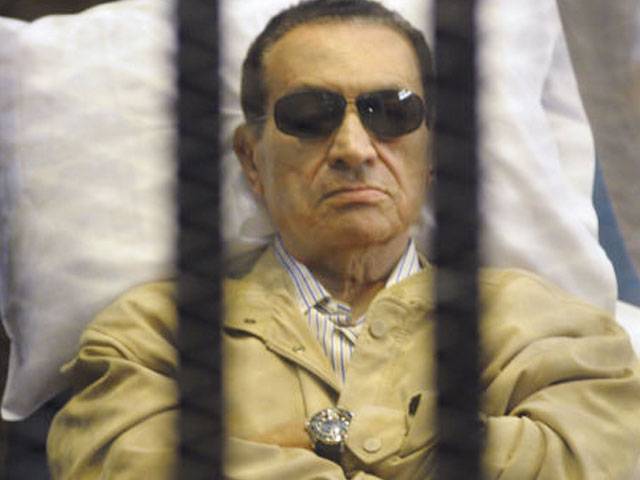CAIRO (AFP/Reuters): Former Egyptian president Hosni Mubarak was transferred Thursday from a military hospital back to prison to await a retrial in May over his role in the deaths of protesters in 2011, a security source said.
Mubarak was taken by ambulance to Tora prison under heavy security escort, the source told AFP. Egypt’s public prosecutor ordered Mubarak back to prison on Wednesday after his health was deemed stable.
Mubarak, 84, was being treated for a heart condition, fractured ribs, fluid in the lungs, depression and high blood pressure, according to his lawyers and official accounts.
Meanwhile, a loose alliance of Egyptian opposition parties said it is preparing to take part in a parliamentary election later this year, a sign that Islamist President Mohamed Mursi’s secular opponents may drop plans for a blanket boycott.
The National Salvation Front, an umbrella group formed last year in opposition to the Islamists, said in a statement it was getting ready for the election while pursuing “the struggle” to create the right atmosphere for a free and fair vote.
The grouping of leftist and liberal parties had said it would boycott the election originally called by Mursi for April. The vote was then postponed by a court ruling. Mursi has said the election could now begin in October.
In a statement, the NSF repeated demands for a neutral government to oversee the election and the appointment of a new prosecutor general: the current one is viewed by the opposition as biased in favor of the Brotherhood.
But it did not explicitly threaten a boycott of the vote, in what analysts saw as a recognition that some of its members, such as the liberal Wafd Party, plan to take part regardless.
The NSF said it considered parliamentary elections one of the ways to save the nation “when guarantees that they are free and fair are in place”.
The election will decide the make-up of the new lower house of parliament. The previous lower house, led by the Muslim Brotherhood’s party, was dissolved last June on the basis of a court ruling that found the election law to be illegal.
The upper house of parliament, which has legislative power, approved a new election law last week. The law was then referred to the Supreme Constitutional Court, which will examine its legality in accordance with the constitution.
Friday, April 19, 2024
Egypt’s Mubarak goes back to prison

8:27 AM | April 19, 2024
8:09 AM | April 19, 2024
Minister advocates for IT growth with public-private collaboration
9:57 PM | April 19, 2024
Formula 1 returns to China for Round 5
9:05 PM | April 19, 2024
Germany head coach Julian Nagelsmann extends contract till 2026 World Cup
9:00 PM | April 19, 2024
IMF urges Italy, France to spend less, Germany to loosen purse strings
8:57 PM | April 19, 2024
Empowering Women: The Vision of Maryam Nawaz Sharif
8:37 PM | April 19, 2024
A Tense Neighbourhood
April 19, 2024
Dubai Underwater
April 19, 2024
X Debate Continues
April 19, 2024
Hepatitis Challenge
April 18, 2024
IMF Predictions
April 18, 2024
Kite tragedy
April 19, 2024
Discipline dilemma
April 19, 2024
Urgent plea
April 19, 2024
Justice denied
April 18, 2024
AI dilemmas unveiled
April 18, 2024
ePaper - Nawaiwaqt
Advertisement
Nawaiwaqt Group | Copyright © 2024





